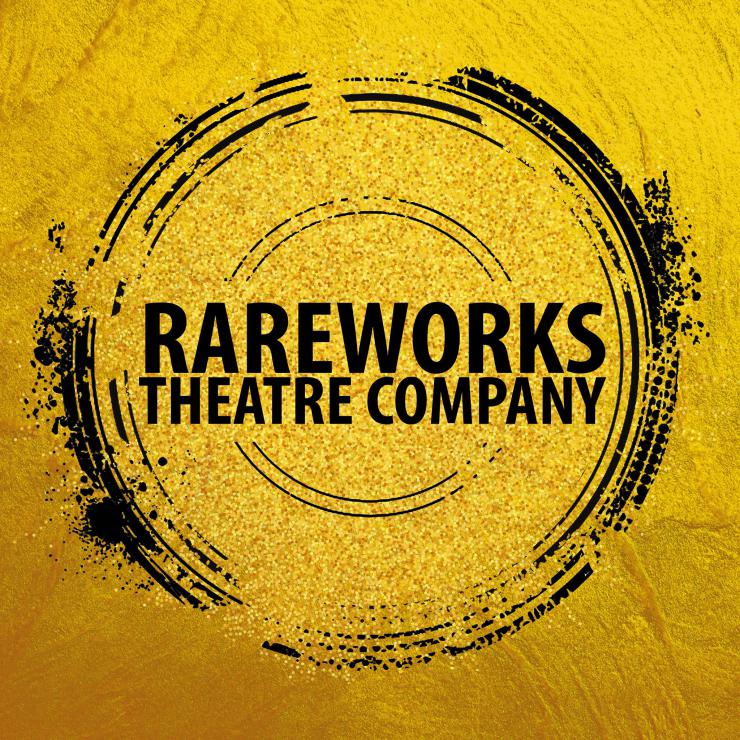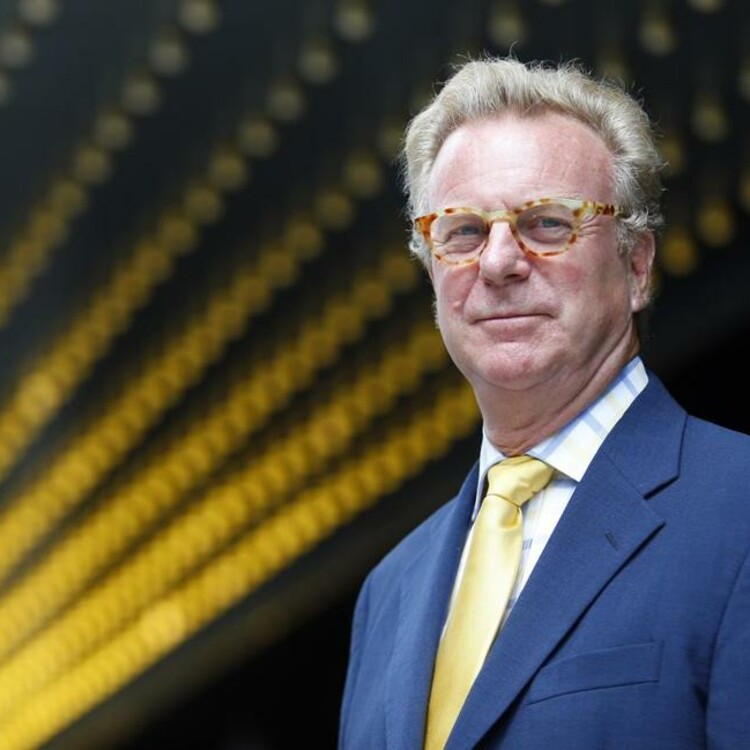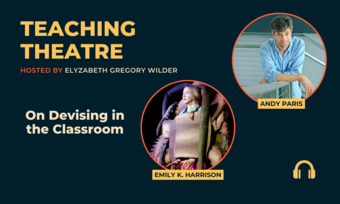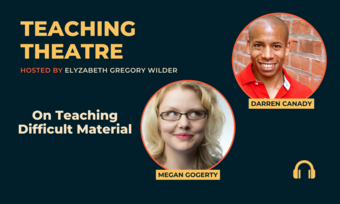An Introduction to the Emerson Theater Community
When the Center for Theatre Commons first landed at Emerson College, few students knew exactly how to react. In April, the Commons dedicated a whole week on HowlRound to the venture at Emerson and what it meant to partner with an academic institution. In their own time, Emerson students began to approach the alien organization. Polly, Jamie, David, and Vijay made appearances around campus, encouraging students to seek them out. They touted the "Creative Producer in Training" program, which drew in even more students. But what really sold the Commons to students was the couch and dart board in their office. Throw in a flimsy, plywood-topped table lined with solo cups and the Commons staff might be just like any of the rest of us. They're just some crazy artists with a kooky idea that talking about what we do might benefit what we do.
Slowly but surely, the Emerson theatre community has started to absorb The Commons into its collective identity. To be sure, there are still students who have no idea what function The Commons serves, but very few are completely ignorant of its existence. Suddenly, we are no longer operating in a bubble quite the way we used to. Sure, Emerson has always been successful at connecting students to the professional world; a new campus in Los Angeles and the recent addition of ArtsEmerson to the college's ventures in no way implies that we desire hermitage. The difference now is that for all the looking at the world we do, The Commons' ever-increasing following of industry giants and new voices is looking right back at us.
This week, I've challenged members of the Emerson theatre community to step up to the plate. This week we endeavor to do the single bravest, most gut-wrenching, painfully exquisite thing a group of people can do to another group of people: we're going to introduce ourselves. I'll start: My name is Nick. I'm a senior theatre studies major, and I am in no way qualified to speak on behalf of my peers. So I won't do that. I'll do my best to let the community speak for itself. It has been my great pleasure over the past few weeks to steal my peers away for a moment, talk to them one on one, and find out what they think makes this community worthy of note. The answers have surprised me, and I hope that they speak to you too.
More important than what we are—our studios, our companies, our academics—is what we do. For that, I'll let my peers do the talking.
The Basics
Emerson sports five, shiny student theatre organizations: Emerson Shakespeare Society is dedicated to the Bard; Musical Theatre Society is the oldest student organization and is the authority when it comes to student-produced musicals; Kidding Around is dedicated to creating theatre for young audiences; Mercutio is a repertory-style company, creating edgy work with a core collection of artists. The fifth company, RareWorks Theatre Company, is very close to my heart—I've been the producing director for a year and a half. We do precisely what our name suggests: new, provocative, and rare plays and musicals. Additionally, there exist a number of performance groups that are not recognized and funded by the Student Government Association.

Linked to the School for the Performing Arts is Emerson Stage, the college's producing arm, which puts productions helmed by faculty and executed by students into one of Emerson's five major performance venues. And for anyone left over, there are always those who chose to self-produce theatre. Between all of these organizations, on average, there are upwards to forty or fifty productions taking place each academic year. All of this doesn't count our relationship with ArtsEmerson, our previous partnerships with professional theatre companies in Boston and New York, nor does it recognize the multitude of Emerson students who take on internships and paying positions at local nonprofit theatre organizations. And I haven't even started to talk about the new Paramount Center and the facilities it houses. More important than what we are—our studios, our companies, our academics—is what we do. For that, I'll let my peers do the talking.
Collaboration
Sitting on a cafe stool elevated so far off the ground that her dangling feet might provide clearance enough for a small child, Natalie Bruno tells me about the Ottoman Empire. No, not the Turkish Empire that replaced the Byzantines. She means the Ottoman Empire, as in the collection of cushy, colorful ottomans that sit in the third floor lobby of the newly constructed Paramount Center on Washington Street. The focal point of a cavernous space, these ottomans regularly host a convening of their own. Natalie, a senior majoring in theatre education, refers to this environment as the collaborative epicenter of Emerson's theatre community. She describes students coming and going between rehearsals, meetings, or classes at nearby studios who often make a pit stop here to engage with their peers and professors. "Love it or hate it, we're all in each other's business and we all know what's going on. You can't create theatre in a vacuum here." She would know. Last year, while she was president of Kidding Around, she collaborated with the Shakespeare Society on a production of As You Like It that was tailored to younger audiences.
Natalie and her co-director were inspired to create As You Like It because of the collaboration they witnessed with Songs of Shakespeare, a musical extravaganza that turned the songs in Shakespeare's plays upside down. Natalie claims that the spark ignited in the lobby of the theatre. "It was literally one thing that happened," she said, "that we decided, this is cool, maybe we could do this too." The popcorn collaboration effect Natalie described is not a rare occurrence at Emerson. With so many creative minds in such close proximity, it's nearly inevitable that one good idea would inspire the next. "With some exceptions, I don't think that Emerson students are focused on our theatre transcending outside of Emerson," she says. "It's almost like it’s a little theatre lab where we hone our skills before we have to worry about the real world and making money and filling seats because we have to pay the electric bill." In this environment, she suggests that we are learning to play nice with others.
The Lab
Natalie isn't the only student who sees Emerson as a testing ground for collaboration and new ideas. Ashley Roberts, another senior majoring in theatre education, sat on the floor in my room and told me how Emerson is a testing ground for ideas from the professional world. Ashley is currently working for ArtsEmerson as a creative producer in training. She's responsible for helping to produce and manage performance artist’s Daniel Beaty's upcoming residency with Arts Emerson as well as a student production with her home-based company, Mercutio. She talked about the overlap between her experience working professionally and working with student groups. "I need a team. I need people to talk to. I find the most value in the conversations. For a week, I was out of touch with my producer and I was so lost. I sat alone for too long and got stuck in a box." She expressed her desire to bring the same model of conversations from her apprenticeship back to the Emerson lab.
Within Mercutio, she sees opportunity to host big-idea brainstorms. "It's funny, this is the exact kind of community I should be using to host theatre conversations. Maybe we haven't really used it to it's fullest potential yet." Getting very excited, she tells me that she envisions utilizing Mercutio's relaxed environment to have meetings that mirror those from her creative producer training, in which the company examines what is and is not working on the macro level. "I have a great plan for the next meeting."
Back in the Emerson Cafe, I spoke with Rob Onorato, a junior theatre studies major and the lighting designer for the Shakespeare Society's production of Cyclops: A Satyr Play. The production could best be described as dubstep Rocky Horror meets late-night Euripides. It was wildly successful. Rob, who created his first-ever lighting design for this show, feels that the success of Cyclops and other experimental shows like it comes from Emersonians who are willing to get down and dirty with form. "The projects that are happening here are not actively concerned with, 'What am I going to do when I get out of here?' or, 'What is the future of my field going to be?' or, 'How is this project going to change theatre in America?' But I feel like the very open and generous and collaborative atmosphere of this school provides a testing ground and an opportunity for ideas and projects and thoughts and movements that are going to be something significant. And it's going to start because we had the opportunity to roll around in the mud."
Two days prior, Daniel Jones, a senior majoring in dramaturgy and the literary manager for RareWorks Theatre Company, sat with me and cited Cyclops as an example of what makes the Emerson theatre community such a wonderful creative testing ground. "We have beautiful minds here and they start developing these insane concepts," he muses, "I go to see shows here and I'm like, 'I would never in a million years think of that,' but someone else did.” He views Emerson as an egalitarian environment ripe for creative exchange because judgment isn't an issue. "It's all allowed because permission has been granted to do whatever you want."
Professionalism
Some Emersonians told me they see the theatre community at Emerson as a microcosm of the real-world industry. Others see it as a professional launch pad. Just last year, two new shows were workshopped with Emerson student organizations that either had a life in the "professional world" before or after their time at the college. Not to mention Emerson Stage's collaboration with the SITI Company on Cafe Variations. What was not so unanimous was the perception of how this benefits our community. Gigi Watson, a junior musical theatre major, observes that, "...people are just wonderfully desperate to create a professional product and do professional work." But she admits that when she is working in new environments, she combats anxiety by reminding herself not to take herself too seriously. She is trying to craft an "artistic agility," she says, which will allow her to traverse all types of processes.
Moreover, some confess that while there is a character of professionalism to the work that we do here, we may not reflect the professional world quite the way that we think. Nicky Maggio spent the past summer interning for NYC Fringe, producing seventeen shows. Prior to interning with the Fringe, the junior directing major knew of producing only through what he had learned as an associate producer for student organizations. "Producing here at Emerson is really different from producing in the real world (although there is still some overlap). In the world outside of academia and outside of Emerson, so much of producing is really about the money." Emerson student organizations are funded by the college, and while some organizations petition for more money, rarely do we have to consider the same financial concerns as real-world companies.
Thoughtfulness
With each student I interviewed, I asked what projects they were currently working on. Everyone responded with at least three, many with more. While speaking with Nicky, I asked him how many major projects he had taken on during the last four semesters. Fourteen was the magic number. I've also heard tale of one student who tackled seven designs in one semester. My follow-up question explored how effectively we handle that balancing act. Polly Hilton, a sophomore musical theatre major, claims that, "…it's easy to get caught up in the idea of doing a show. In the idea of 'Hey, I'm doing a piece. Come be a part of it!' It's easy to lose the thoughtfulness and artfulness. We get overwhelmed by all the noise." Her peers agreed. Rob admits that, "I have found that even just keeping up with what's required with my classes and just staying sane almost prohibits me from working on projects. I personally care about the academic classes that I'm taking here, but I also feel that extracurriculars—at least as far as theatre is concerned—are more educational than some of my classes. But I have to do the classes."
Who We Are
To lump all members of the Emerson theatre community into one category would be futile reductionism, to say the least, but I couldn’t help wondering what runs through this community that gives us our identity. A set of values? A shared experience? A kind of dialect? Curiosity got the better of me, so I asked. If I were walking down the street, how would I recognize a member of the Emerson theatre community? The answers were illuminating and had more similarities than I anticipated. “Loud” was perhaps the most common answer. Junior directing major, James Blaszko, claims I would notice them by the armful of props they shuffle up and down Boylston Street. In my interview with Nicky two days later, he offered up nearly this exact same image. So we can infer that we’re busy.
Then there came the more intangible answers. Rob and junior design and technology major, Joey Guthman, told me that it was a kind of spark— something you can sense. Perhaps it’s something we can’t see because we’re simply too close to it. Gigi Watson spoke to our bravery. She said that one could recognize a member of the Emerson theatre community because they were unafraid to meet any challenge. She said that we can be seen challenging each other, holding one another up, and asking “what more can we do?” I thought about this for days after our interview. For all the places I have been and worked outside of Emerson, what did I believe was missing? It seems to me now that Gigi’s assessment fits the bill. I have been fortunate to work with brilliant minds and with remarkable organizations, but no one rises to a challenge quite like an Emersonian.
She said that one could recognize a member of the Emerson theatre community because they were unafraid to meet any challenge.
Putting the Pieces Together
Brian Dratch and I sat in the basement of the Paramount Center, sharing fries and taking fifteen minutes to talk in between classes. Brian used to be a member of the BFA musical theatre program but switched (not dropped; one degree isn’t lower than another, folks) to the BA in theatre studies. The BA theatre studies degree provides students with the opportunity to explore the field within a number of concentrations. Brian concentrates in acting and directing. He said that he made the switch because he wanted to start looking at the bigger picture. “Very often as an actor I felt like a puzzle piece.” He told me, “As the director, you often feel like the person putting the puzzle together. That was more fulfilling to me.”
In many ways, that is what is happening here: This community has started to consider the puzzle laid out before them, looking at the status quo, and mixing up the pieces to make a new image. The presence of the Commons on this campus further validates that quality of questioning and experimentation. As a collective, we’re laying down the tools of our trade and asking, “What can we make with this?” In this introduction of us to you, showing you only twelve pieces will never be able to complete the thousand piece puzzle that is the Emerson community. There are important people—faculty, staff, artists in residence, and more student leaders who have been left out of this portrayal. With any luck, though, the Center for the Theatre Commons and HowlRound will be here for a while. We’ll have ample time to see one another, dance together, convene together, and maybe put together an image of our own.












Comments
The article is just the start of the conversation—we want to know what you think about this subject, too! HowlRound is a space for knowledge-sharing, and we welcome spirited, thoughtful, and on-topic dialogue. Find our full comments policy here
Nice introduction. I've cast a number of Emerson students in my shows over the past 13 years, both at my current company, Liars & Believers, and at Boston Theatre Works. The intersection of the academic arts world and the professional arts world in Boston creates great opportunities for young artists and for companies.
My recent challenge has been to find students in areas other than acting. I've been looking for directing interns and for film interns for our recent work and they're very hard to reach. As an experimental fringe company, I wish it were easier to create relationships with the Emerson community.
We know you're there and have a lot to give, and we have a lot to share with you.
Being a Sophomore directing major at Emerson, I can tell you that the frustration is double sided. Getting cast onstage is sometimes easier than finding an internship in directing.
Very articulate- you describe it very well and I miss it immensely!